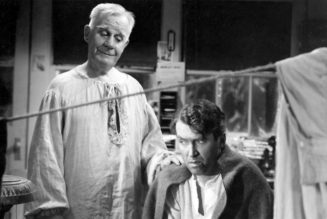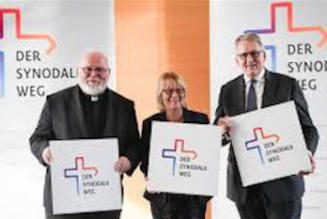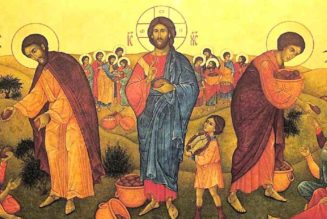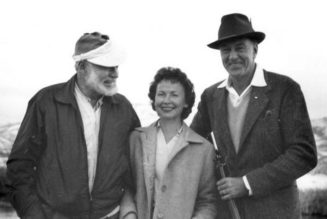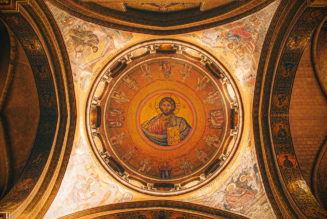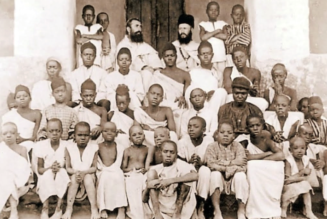I was traveling, to say the least, during most of the Catholic-kicker-gate scandal — as in the online firestorm about the recent Benedictine College commencement address by Harrison Butker of the Kansas City Chiefs.
Oh my. Yes, the superstar placekicker had a lot of conservative Catholic things to say about marriage, workaholism, careerism and homemakers. That’s what created a tsunami of headlines. But what was The Big Idea in that Butker speech? Hold that thought.
If you have a month or two to spare, you can scan page after page of Google hits covering the news and the commentary about this highly symbolic battle in America’s culture wars. I am, by the way, using sociologist James Davison Hunter’s original definition for that much abused term, based on his landmark book “Culture Wars: The Struggle to Define America.”
Back in 1998, I wrote my 10th anniversary “On Religion” column about the influence of Hunter’s book on my approach to religion-beat news. Here’s a passage describing a key fault line in American faith and culture that Hunter spotted in the late 1980s:
The old dividing lines centered on issues such as the person of Jesus Christ, church tradition and the Protestant Reformation. But these new interfaith coalitions were fighting about something even more basic — the nature of truth and moral authority.
Two years later, Hunter began writing “Culture Wars: The Struggle to Define America,” in which he declared that America now contains two basic world views, which he called “orthodox” and “progressive.” The orthodox believe it’s possible to follow transcendent, revealed truths. Progressives disagree and put their trust in personal experience, even if that requires them to “resymbolize historic faiths according to the prevailing assumptions of contemporary life.”
Hunter noted, for example, that speakers at a typical pro-life rally would include a Baptist, a Catholic priest, an Orthodox rabbi and a cluster of doctrinally conservative Methodists, Presbyterians, Episcopalians and Lutherans. Then, an abortion-rights counter-rally would feature a “moderate” Baptist, a Catholic activist (perhaps nuns in pantsuits), a Reform rabbi and mainline Methodists, Presbyterians, Episcopalians and Lutherans.
In other words, “conservative” Catholics now have more in common — in terms of beliefs about family and culture — with Orthodox Jews, Southern Baptists, Eastern Orthodox believers or Assembly of God laity than with, let’s say, clergy and faculty at many Catholic institutions in blue zip codes.
That leads me to this interesting passage in a Substack essay by cultural critic Bethel McGrew: “The Kicker — On Harrison Butker and the state of Catholicism.”
… Harrison has been branded a “misogynist psycho,” among other choice phrases. “I just hope he is canceled to Hell and back,” rants one charmingly expressive older woman, who pronounces him “the most sexist, white supremacist d*ck I have ever seen in my life” and feels “so sorry that his wife has to sleep with him.” … These sorts of reactions were so numerous that even Bill Maher — a man who in his own words has “never held a baby and never will” — couldn’t understand what all the fuss was about. Meanwhile, in unrelated news, Harrison’s jersey appears to have sold out in women’s sizes. …
Amusingly, the unhinged older woman who pities Harrison’s wife referred to his speech as an example of “evangelical Christianity.” In her impoverished religious vocabulary, “evangelical” seems to be her catch-all label for “stupid Christian sumbitches somewhere to my political right.” Perhaps this is because in an American context, evangelicals are the Christian voting bloc most commonly associated with conservative values. With Catholics, the associations are more mixed. Which, if you carefully listen to (or read) the entire speech, is exactly Harrison’s point.
By all means, Rational Sheep supporters who care about “culture wars” issues will want to read the entire speech or maybe even take a 20-minute break to watch the video — which, in terms of body language and voice tone, offers clues as to when Butker was being ironic or snarky.
Now, I don’t want to turn this post into a commentary about this week’s “On Religion” column, in which I focused on the NFL star’s remarks about husbands, wives and marriage. I covered that material as quickly as I could, since these words drove the public debates about whether Butker — as a public figure — had a right to say what he said.
Butker asked the female graduates: “How many of you are … thinking about all the promotions and titles you’re going to get in your career? Some of you may go on to lead successful careers in the world. But I would venture to guess that the majority of you are most excited about your marriage and the children you will bring into this world.”
Butker stressed that his wife, Isabelle, is “a primary educator to our children. She is the one who ensures I never let football or my business become a distraction from that of a husband and father. … It is through our marriage that, Lord willing, we will both attain salvation.”
Pundits and comics claimed that Butker criticized working women — while his mother, Elizabeth, is a medical physicist in the radiation oncology department at Atlanta’s Emory University School of Medicine. In a 2020 Mother’s Day tribute, Butker tweeted: “Growing up my mom was my biggest supporter, guiding me to be the man I needed to become.”
Earlier this week, Change.org had gathered 221,866 signatures urging “the Kansas City Chiefs management to dismiss Harrison Butker.” The petition said the kicker’s remarks “were sexist, homophobic, anti-trans, anti-abortion and racist” — thus hindering “efforts towards equality, diversity and inclusion in society.
I felt rather conflicted about focusing my column on that marriage-and-family theme, since it was clear to me that The Big Idea in this speech — roughly 50% of its contents — centered on Butker’s concerns about divisions inside American Catholicism.
To cut to the chase: Yes, this man is a traditional Latin Mass believer and it’s safe to assume he will not be granted an audience with Pope Francis anytime soon. But I think, as a matter of doctrine and debates about Catholic culture, it helps to let Butker (for better and for worse) speak for himself.
I am convinced that the following passage — about the coronavirus and sacraments — is the key. This is long, but essential:
The chaos of the world is unfortunately reflected in the chaos in our parishes, and sadly, in our cathedrals too. As we saw during the pandemic, too many bishops were not leaders at all. They were motivated by fear, fear of being sued, fear of being removed, fear of being disliked. They showed by their actions, intentional or unintentional, that the sacraments don’t actually matter. Because of this, countless people died alone, without access to the sacraments, and it’s a tragedy we must never forget. As Catholics, we can look to so many examples of heroic shepherds who gave their lives for their people, and ultimately, the Church. We cannot buy into the lie that the things we experienced during COVID were appropriate. Over the centuries, there have been great wars, great famines, and yes, even great diseases, all that came with a level of lethality and danger. But in each of those examples, Church leaders leaned into their vocations and ensured that their people received the sacraments.
Great saints like St. Damien of Molokai, who knew the dangers of his ministry, stayed for 11 years as a spiritual leader to the leper colonies of Hawaii. His heroism is looked at today as something set apart and unique, when ideally it should not be unique at all. For as a father loves his child, so a shepherd should love his spiritual children, too.
To cut to the chase: Did it matter — IN REALITY — that many Catholics died, during the pandemic, without the ability to go to confession, without receiving Holy Communion and without receiving Last Rights from a priest?
Butker is asking: Do Sacraments matter? Do Catholics believe that Sacraments have anything to do with reality, in this life and in eternity? Yes, that amazing pre-pandemic Pew Research Center headline is looming in the background: “Just one-third of U.S. Catholics agree with their church that Eucharist is body, blood of Christ.”
The Benedictine College speech contained more than a few bitter quotations and passages that, frankly, preached on complex issues in Catholic theology that may be above the pay grade of a young NFL millionaire. Butker does have his share of anger issues with some modern priests and bishops.
But I will ask: Is Butker on target, with his fierce focus on the importance of Sacraments, especially for young believers who want a strong foundation for the big decisions in their lives?
Let’s end with a final thought from McGrew, reacting to those who scoff at the doctrinal concerns at the heart of the Butker address:
This, of course, walks straight into Harrison’s point, which is that he speaks for a generation which desperately wants to believe that things like the Eucharist mean something, and is not at all sure this is what their leaders believe. Today, I stumbled onto a touching little clip of the Catholic president of Poland catching a Eucharist Host as it threatens to blow away in the wind. Once the Host is consecrated, Catholics are to protect it with exactly this sort of care, making sure it’s not lost or wasted. I once read a moving anecdote from World War II about a chaplain who fell in the act of giving a man communion. Racing to recover the body, his colonel took the Host out of the chaplain’s hand and quickly consumed it, which is the standard Catholic protocol if a chaplain dies in combat. To a religious outsider, this might seem like a very strange gesture, but it makes sense if you believe the Eucharist means something.
What was the most important “signal” in this firestorm in American sports and celebrity culture? Did more journalists care about Butker’s wisecrack about Taylor Swift than his defense of Catholic Sacraments?
FIRST IMAGE: Harrison Butler fan shirt — styled for females — on sale at ETSY.com


